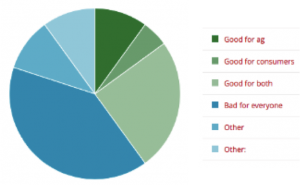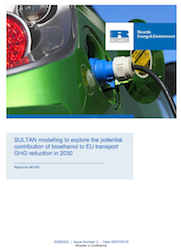The state of Washington has proposed its own Clean Air Rule (CAR) and according to the Renewable Fuels Association (RFA), the rule does not factor in the environmental and health benefits of ethanol blended fuels. In their comments submitted to the Washington Department of Ecology, RFA states that the proposed rule is inconsistent with virtually every other program designed to reduce greenhouse gas emissions (GHGs) and could have the perverse effect of reducing or eliminating the production and use of liquid biofuels in Washington state.
![]() The climate rule is the first of its kind state legislation to cap carbon pollution. Should the legislation pass, it would go info effect in 2017 and would regulate several emissions including those from biofuels. However, “the CAR proposal eschews globally accepted bioenergy carbon accounting methods out of fear that properly recognizing the carbon benefits associated with biofuels would trigger the so-called ‘poison pill’ legislative provision that would shift funding from climate-friendly transportation investments to road and highway construction projects,” according to RFA comments.
The climate rule is the first of its kind state legislation to cap carbon pollution. Should the legislation pass, it would go info effect in 2017 and would regulate several emissions including those from biofuels. However, “the CAR proposal eschews globally accepted bioenergy carbon accounting methods out of fear that properly recognizing the carbon benefits associated with biofuels would trigger the so-called ‘poison pill’ legislative provision that would shift funding from climate-friendly transportation investments to road and highway construction projects,” according to RFA comments.
Citing data from the California Air Resources Board, Oregon Department of Environmental Quality, and U.S. Department of Energy show that first-generation ethanol is reducing greenhouse gas (GHG) emissions by 30–60 percent compared to petroleum, while second-generation ethanol can reduce GHG emissions by 80 percent or more. Yet RFA states Washington state’s proposal fails to recognize those clean air benefits from biofuels.
“The proposed CAR treats biofuels and fossil fuels identically, which sets a dangerous carbon accounting precedent with potentially far-reaching impacts,” RFA wrote in its comments. “Other GHG cap-and-trade programs exempt biofuels from a compliance obligation because it is broadly understood that bioenergy combustion emissions are ‘carbon neutral’ (i.e., the biomass recently removed an amount of atmospheric carbon through photosynthesis that is equivalent to emissions from combustion).”
What is interesting, states RFA, is that the state seems to understand the aforementioned point as the proposed rules exempts emissions from biomass combustion in stationary sources such as the use of woody waste biomass to generate electricity. “It is perplexing that this approach would be (properly) applied to stationary emissions from bioenergy production from biomass combustion, but not to emissions from liquid biofuel combustion,” RFA wrote.
“Implementing the CAR as proposed would set a perilous regulatory precedent, deter investment in the state’s biofuels market, and compel reduced consumption of low-carbon biofuels,” the comments continued. If implemented, developers of advanced biofuel technologies would avoid the Washington state market and instead shift focus on investments in California, Oregon, British Columbia and elsewhere.
“For these reasons… we strongly urge the Department of Ecology to exempt biofuels from compliance obligation in the final CAR,” concluded RFA.










